He continued, “In Rwanda, where we speak of equality, fraternity, and unity, this message is especially powerful. After everything that has happened, we are learning to walk together again as brothers and sisters.”
The 58-year-old Catholic Bishop, who started his Episcopal Ministry in March 2021 following his appointment the previous month recalled how the synodal process has been deeply integrated into the Church’s mission in Rwanda to the people of God in all sectors of society, including marginalized groups and the Small Christian Community (SCCs).
“We have made it a priority to listen to everyone – the children, the Small Christian Communities, prisoners, the disabled, street children, even prostitutes,” he said.
The Bishop of Cyangugu Diocese continued, “We strive to be a Church that goes out to meet the people, that walks with them in their suffering and joys. In my Diocese, we have started a ministry called ‘Christ in each Hhuse’, where we visit every family, bringing the message of Christ’s love and healing.”
He went on to recount how this outreach missionary spirit has been a defining feature of Rwanda’s synodal journey.
(Story continues below)
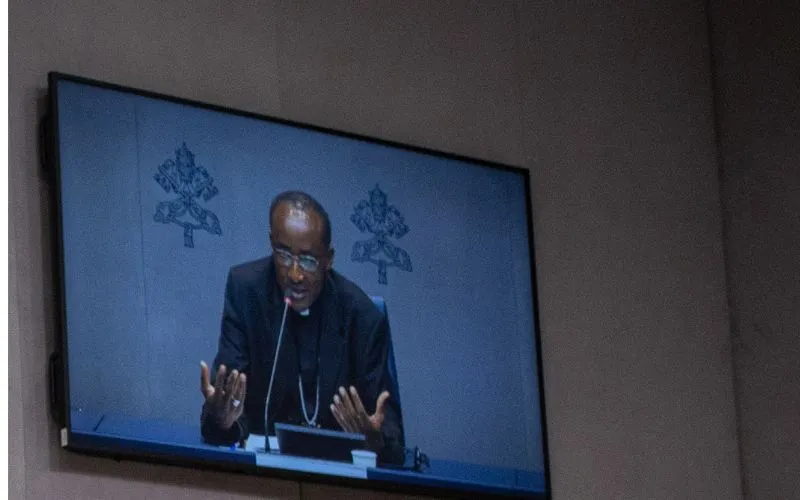 Credit: Daniel Ibáñez
Credit: Daniel Ibáñez
“This synod has taught us to be missionaries not just in the traditional sense, but in a broader way,” he said and added, “We see the Laity, Consecrated people, and Clergy joining hands to visit families, bringing Christ to every home. It is a mission of healing, especially after the wounds left by the genocide.”
At the October 14 press briefing at the Vatican, the Catholic Bishop, who is among the two advisors of the President of the Episcopal Conference of Rwanda (CEPR), Antoine Cardinal Kambanda, also spoke about the role of women in the Church, including the issue of opening the Diaconate to women.
“We are in communion with the Holy Father and the Church, and we trust in the discernment of the Pope and the Bishops. If the possibility of ordaining women as Deacons were to arise, we would follow the path the Church lays out for us,” he said.
For him, “this synod is not just about social change; it is about living together, about communion, about seeing each other as brothers and sisters in Christ. It is a spiritual journey that aligns perfectly with Rwanda’s post-genocide journey of reconciliation and unity.”
Meanwhile, the Secretary of the Synod on Synodality Commission for Information, Sheila Pires, who also spoke at the October 14 Press Briefing shared some Synodal deliberations.
Ms. Pires said that over the past few days, the sessions focused on decision-making processes, transparency, responsibility, and assessment as outlined in the Instrumentum Laboris.
She outlined a variety of perspectives from different regions of the world, including China, the Arabian Peninsula, the Amazon, the Seychelles, and the Sahel.
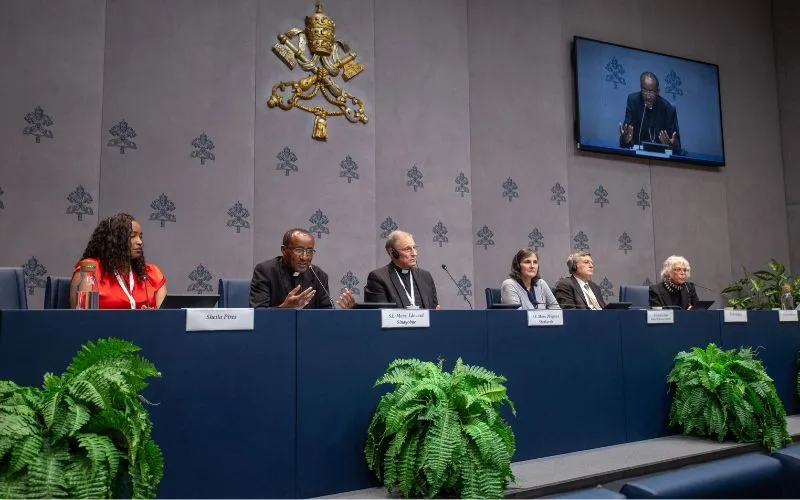 Credit: Daniel Ibáñez
Credit: Daniel Ibáñez
“It was important to listen to these global experiences,” the Mozambican Catholic journalist based in South Africa said, adding, “These testimonies point out to the difficulty in harmonizing Christian traditions with local customs and civil regulations, particularly in areas like marriage.”
She continued, “Participants acknowledged that the Church in the past often failed to embrace the diversity and complementarity of different cultures. However, initiatives such as the Conference in the Amazon were praised for offering platforms where diverse realities could be voiced. The African Church, too, was commended for its vitality in addressing these issues.”
One key focus of the synodal discussions was the involvement of children, youth, and Catholic women in the life of the Church, Ms. Pires, who serves in the communications office of the Southern African Catholic Bishops’ Conference (SACBC) said at the October 14 Press Briefing.
She underscored the need not just to speak about children, but to speak with them, and emphasized the value of Catechists and actively listening to the concerns of young people.
On the need for women to be involved in the life of the Church, Ms. Pires said, “Women’s participation is essential because they see things others do not, ensuring balanced Priestly formation and enriching future Priests' education.”
“The issue of spiritual abuse was also discussed, and participants noted that Religious women, especially those working with vulnerable communities, often struggle to express concerns about abuse due to societal patriarchal structures,” she said.
ACI Africa was founded in 2019. We provide free, up-to-the-minute news affecting the Catholic Church in Africa, giving particular emphasis to the words of the Holy Father and happenings of the Holy See, to any person with access to the internet. ACI Africa is proud to offer free access to its news items to Catholic dioceses, parishes, and websites, in order to increase awareness of the activities of the universal Church and to foster a sense of Catholic thought and culture in the life of every Catholic.
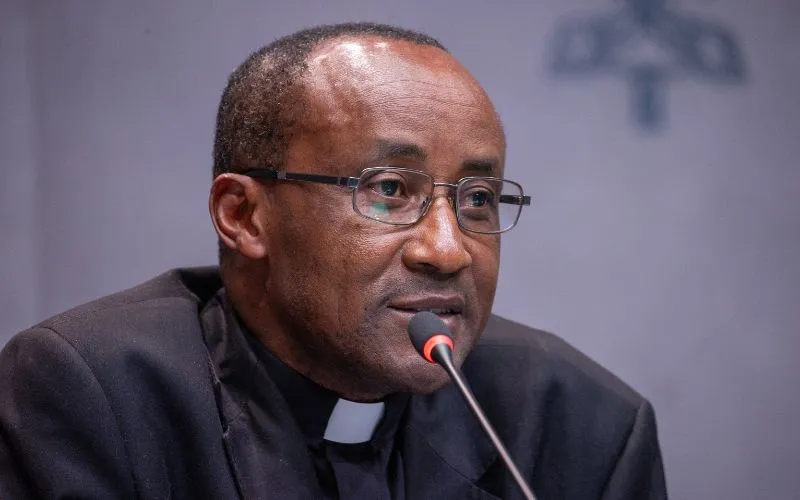 Bishop Edouard Sinayobye of Rwanda’s Catholic Diocese of Cyangugu during the 14 October 2024 press briefing in Rome. Credit: Daniel Ibáñez
Bishop Edouard Sinayobye of Rwanda’s Catholic Diocese of Cyangugu during the 14 October 2024 press briefing in Rome. Credit: Daniel Ibáñez


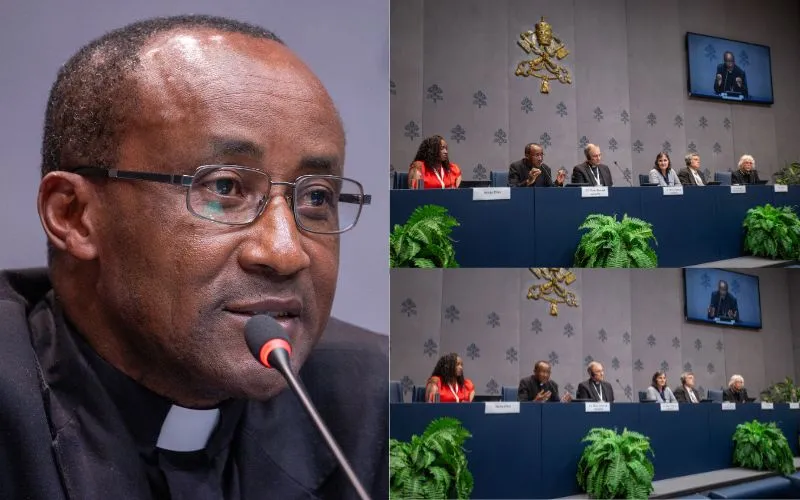

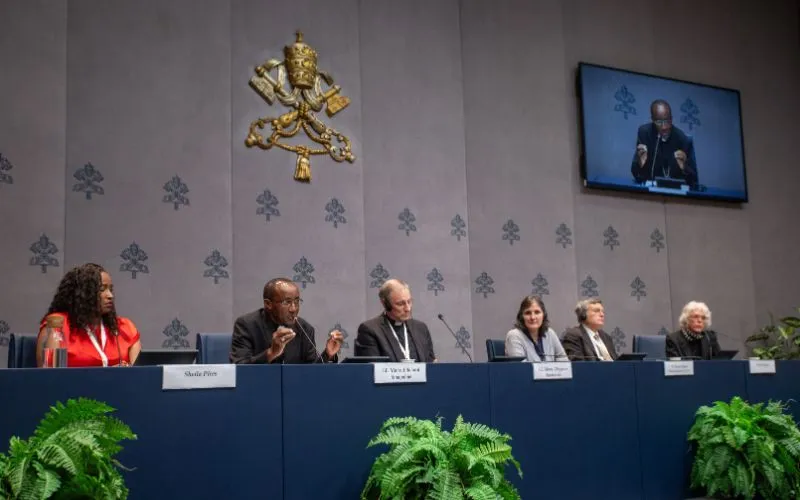 Credit: Daniel Ibáñez
Credit: Daniel Ibáñez Credit: Daniel Ibáñez
Credit: Daniel Ibáñez Credit: Daniel Ibáñez
Credit: Daniel Ibáñez


